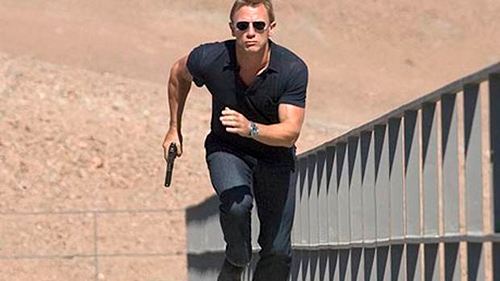
The 25th James Bond movie No Time To Die arrives in Cineworld in September, and we're counting down the days by revisiting all the 007 movies in chronological order of release.
In honour of Daniel Craig's swansong as 007, we're taking a nostalgic trip back through time. Next up: Daniel Craig's second Bond movie, Quantum of Solace.
What is the story of Quantum of Solace?
In the wake of Vesper Lynd's (Eva Green) death in Casino Royale, James Bond is a haunted, wounded man. He has brought the ruthless Mr. White (Jesper Christensen) to his superior M (Judi Dench) for interrogation, where White reveals that he is but a pawn in a sinister global organisation known as Quantum.
Wracked by guilt over Vesper's death, Bond embarks on an international crusade as he delves into the mysterious world of Quantum. His search leads him to nefarious middle-man Dominic Green (Matthieu Amalric) who is striking a shady deal for power over Bolivia's water supply. Also out for revenge like Bond is the vigilante Camille (Olga Kurylenko), whose father was murdered by a Bolivian general, now one of Green's associates. Together, they find themselves on a collision course with a deadly collective of power-hungry individuals.
How did Quantum of Solace get made?
In 2007, James Bond met his greatest foe: the Writers Guild of America (WGA). In November 2007, the organisation launched a Writers Strike owing to a dispute over residual payments via DVD and internet sales, a process that would stretch until February 2008. Unfortunately, the production on Daniel Craig's second Bond movie, Quantum of Solace, coincided with that exact same period.
So fraught was the process that screenwriter Paul Haggis, who had worked on 2006's Casino Royale, got his script outline (a revision of an earlier draft by Neal Purvis and Robert Wade) delivered just two hours before the strike was due to begin. Once principal photography on Quantum of Solace commenced in January 2008 (second unit photography had already been completed by this stage), under WGA rules, no screenwriter was permitted to make any further alterations to the screenplay.
It's, therefore, no surprise that Craig's sophomore Bond movie is a far scrappier and messier affair than its critically acclaimed predecessor. Craig would later explain: "We had the bare bones of a script and then there was a writers' strike and there was nothing we could do. We couldn't employ a writer to finish it. I say to myself, 'Never again', but who knows? There was me trying to rewrite scenes—and a writer I am not."
Craig also explained that he and director Marc Forster "were the ones allowed to do it. The rules were that you couldn't employ anyone as a writer, but the actor and director could work on scenes together. We were stuffed. We got away with it, but only just. It was never meant to be as much of a sequel as it was, but it ended up being a sequel, starting where the last one finished."
In fact, script concerns had already hastened the departure of original director Roger Michell, who blanched at the fact that there was a fixed release date but no completed screenplay. Forster, an art-house director best known for the likes of Finding Neverland (2004), was a surprising choice of replacement; he later explained that he wanted to make the movie "fast... like a bullet", citing his displeasure with Casino Royale's 144-minute running time.
Lean though Quantum of Solace is, the movie frequently tips over into incoherence. This was no doubt accentuated by the constant on-set rewrites, and Forster later explained that he was compelled to edit sequences on the fly, hoping that the sheer blur of forward-thrusting action might help disguise the logical fallacies in the script.
Compounding an already messy pre-production process was the choice of the film's title; longstanding Bond producer Michael G. Wilson alighted on it just before principal photography was about to begin. The phrase 'quantum of solace' is derived from Bond author Ian Fleming's anthology For Your Eyes Only, but maybe it was too parochial, too niche a choice. Even Craig himself struggled to justify the title, later saying: "I was unsure at first. Bond is looking for his quantum of solace and that's what he wants, he wants his closure. Ian Fleming says that if you don't have a quantum of solace in your relationship then the relationship is over. It's that spark of niceness in a relationship that if you don't have you might as well give up."
For all its (not inconsiderable) flaws, Quantum of Solace owes more to Fleming's source material than just the title. The film's relatively grounded grittiness, while owing a great deal to the critically acclaimed Casino Royale, is of a piece with the violent, bleak nature of Fleming's writing, in which Bond is not an idealised figure but a person as damaged as the quarry he's pursuing.
Forster was tapped into this sense of moral ambiguity, explaining: "Because Bond plays it real, I thought the political circumstances should be real too, even though Bond shouldn't be a political film. I thought the more political I make it, the more real it feels, not just with Bolivia and what's happening in Haiti, but with all these corporations like Shell and Chevron saying they're green because it's so fashionable to be green. During the Cold War, everything was very clear, the good guys and the bad guys. Today there's much overlapping of good and bad. It isn't as morally distinct, because we all have both elements in us."
The aesthetic principles behind Quantum as a film are admirable; it's the execution that lets the side down. That the film came hot on the heels of the incendiary, brilliant Casino Royale also doomed it to failure; Daniel Craig made an immediate impact as a far more plausible 007, one who gets physically battered during fights and eventually lets his emotional guard down, to his great detriment. These complex human fallacies are still present in Quantum of Solace (owed almost entirely to Craig's haunted performance) but are somewhat buried within the film's blitzkrieg momentum.
Quantum of Solace has also been criticised for ditching the franchise's reliance on exotic escapism, replacing it instead with a far more nihilistic approach largely taking place in and around arid desert environments. Then again, this is more akin to Fleming's original novels than something like Moonraker (1979); although jet-setting was present in the novels, Fleming never pushed the notion into travelogue self-parody. On some level, one can imagine Quantum of Solace honouring the second act of Fleming's Diamonds are Forever, which takes place in an imitation American Western town in the Nevada mountains.
Once again, this is all well and good – but is it particularly fun or emotionally involving? Exhausting might be a better word to describe Quantum, which hits the ground running with a full-throttle Aston Martin car chase and continues in the same vein pretty much all the way through. Craig would later say that Quantum wasn't intended as a direct sequel to Casino Royale (in fact, this makes the film somewhat unique in the Bond canon), but it evolved along those lines owing to the torturous writing process.
On a massive $200 million budget, the production swept from Lake Garda (the aforementioned car chase) to Panama to Austria to Chile and Bolivia. Forster imported many crew members with whom he had worked before, or whose work he had otherwise admired. This included cinematographer Roberto Schaefer (DP on Finding Neverland), production designer Dennis Gassner (a replacement for the recently retired Bond veteran Peter Lamont) and editor Matt Chessé (another Finding Neverland alum). Other choices are more puzzling, namely the junking of credits designer Danny Kleinman, who had joined the series with 1995's GoldenEye. He departed in favour of MK12, whose title designs are gaudily garish but lack the brilliant, poetic commentary of Kleinman's work.
For all the film's handsome, mega-budget credentials, however, it resembles a movie that's been sliced and diced by a Cuisinart. We're regularly dropped into new locations at helter-skelter speed, but we have no time to absorb the geography of each location (typically a Bond movie hallmark) because Chessé's editing (working with United 93's Richard Pearson) is so aggressively choppy. One laments the amount of research and location photography that went into capturing Bolivia's visually striking ESO Hotel (standing in for Dominic Green's hideaway during the climax); in the finished product, we get frustrating snatches of establishing shots before some explosive canisters are ignited and the next action scene is launched.
As mentioned, Forster's hand was behind this decision, seemingly hellbent on keeping things economical while, undeniably, working in the shadow of another massive spy franchise, Jason Bourne. Those movies, initiated by Doug Liman and continued by Paul Greengrass, adopted a far more gritty, cinema verite idiom replete with handheld camerawork and appreciably close-quarters fighting sequences. However, one is never at a loss to understand what is happening during the action scenes in the Bourne movies, owing to the precise and metronomic timing of the choreography and editing; it's frantic but never incoherent. Quantum tips over the edge, becoming a pale imitation that wears out the audience in just 108 minutes. The influence of Bourne is hardly surprising given Quantum enlists the help of second unit director Dan Bradley, who had worked on the former franchise.
That said, there is plenty to admire about Craig's second Bond movie, not least the performance of its leading man. The movie isn't completely devoid of emotional nuance, and when things do eventually calm down (although for little more than a few minutes at a time), Craig's acting shines in all its bruised, vulnerable complexity. One scene in which he gets quietly drunk on a plane to the tune of several Vesper cocktails (named after his lost love) is genuinely moving, hinting at the human being beneath Quantum's two-fisted automaton.
Later on, Bond is forced to reckon with the loss of his former colleague Mathis (Giancarlo Giannini), whom he had wrongly fingered as a traitor in Casino Royale. As a result of Bond's actions, another key ally falls dead in the street, forcing 007 to ignominiously dispose of his body in a nearby dumpster. It's in scenes these that Quantum comes achingly close to the texture of Ian Fleming's source material, the notion of a killing machine in Her Majesty's employ who is compelled to reckon with the consequences of his actions.
Another similarly stinging moment comes with the death of fellow MI6 agent Strawberry Fields (Gemma Arterton), sent, somewhat implausibly, by M to keep an eye on Bond in Bolivia. Although Arterton's character is treated in a disappointingly disposable way (something she would later speak out against), Fields' later suffocation by oil is made all the more powerful by Craig's reactions. Playing off a typically flinty and memorable Judi Dench, he again communicates the essence of a man trying to internalise the death and destruction that occurs around him.
In fact, Craig's interactions with Dench in this film are among the strongest Bond/M sequences in the series. Despite Bond's vigilante nature (something shared with Timothy Dalton's underrated 1989 movie Licence to Kill), M is quick to spot the latent skills in her best agent, and refuses to rat him out to the CIA. This quasi-maternal relationship would hit its logical and emotional peak in Craig's next (and Dench's last) Bond movie, Skyfall, released in 2012.
Certainly, the Bond/M interactions are far more memorable than 007's sequences with fellow vigilante Camille. Although played with conviction by Olga Kurylenko, the character is saddled with too generic and underdeveloped a backstory, despite Forster's attempts to indicate similarities with 007. Likewise, Mathieu Amalric's villain, Dominic Green, possesses all the threat of a mildly disgruntled accountant, a byproduct of the film's attempt at realism, which ultimately just curdles into tedium.
Yet the real inescapable enemy is the lack of a coherent script. We never really understand why the film bears its title (a last-minute coda involving Vesper Lynd's boyfriend is rushed and confusing), and Green's plan to seize Bolivia's water supply is made incomprehensible by the movie's frenetic pace. That said, there are some genuinely fantastic set-pieces, namely Bond's infiltration of a top-secret Quantum meeting at a performance of Tosca in Austria. The sequence is artfully staged for a Bond film (perhaps overly so), deploying Godfather-style cross-cutting as the performers hit their crescendo and Bond wreaks chaos on his enemies.
There's no denying that Quantum of Solace has a tough, demented character all of its own. Certainly, compared to the equally confused Spectre in 2015, Quantum is pacy and admirably committed to hurtling the audience forward, rather than bogging down in confusing retro-fitted backstory. Even so, file this one under 'missed opportunity', rather than 'complete failure'.
READ MORE
- No Time To Die and the 6 James Bond movies we never got to see
- 7 actors who could play James Bond after Daniel Craig retires
- Shaken and stirred! Daniel Craig's defining 007 moments
What music is on the Quantum of Solace soundtrack?
Whatever else is wrong with Quantum of Solace, composer David Arnold's score is terrific, infusing the myriad of action sequences with real momentum and excitement. Before discussing Arnold's work, however, one must address the elephant in the room, which is the title song 'Another Way To Die'. It's a classic example of how two individually strong artists, Jack White and Alicia Keys, can completely cancel each other out in a warbling blur of noise. Combined with MK12's underwhelming opening credits designs, and it's a damp squib of an opener.
Because Arnold wasn't involved in the song's creation (unlike Casino Royale's 'You Know My Name', performed by Chris Cornell), there's no melodic crossover between the track and the composer's underscore. (This is an issue that blighted Thomas Newman's work on the next two movies, Skyfall and Spectre.) Nevertheless, Arnold's work is muscular and bombastic enough on its own terms to leave the title track firmly in its wake.
One recurring motif in Arnold's score was alleged to have come from a rejected song performed by Shirley Bassey, the grand-dame of Bond theme tunes. Speculation was stoked when another of Bassey's songs, 'No Good About Goodbye', written by Arnold and lyricist Don Black, bore a comparison to a moodily enticing string passage in Arnold's Quantum score. However, this has subsequently been denied and no evidence exists that Bassey performed anything for Quantum.
Denied the chance to put his thematic imprint on the score as he did with the BAFTA-nominated Casino Royale, Arnold nevertheless swings for the fences. The aforementioned string theme, calling to mind John Barry's 007 work in evoking a world of espionage intrigue, rises to marvellous heights during 'Night at the Opera'. Suspense is one of the hardest things to make interesting in musical terms, but Arnold's swirling strings and harp perfectly embody the sense of all-encompassing conspiracy. Offset against these are the occasional, tender strains of the Bond/Vesper love theme from Casino Royale, which serves to humanise 007's character in the face of escalating violence.
Aside from the expected dashes of local colour (pan-pipes indicating Bond's jaunts to Haiti and Bolivia), the action music is the real highlight of the Quantum score. By this stage in his career, Arnold was established as one of the finest practitioners of symphonic mayhem, not just due to his association with Bond but also the likes of sci-fi blockbuster Independence Day (1996). Arnold's ability to structure rhythmically coherent yet never overbearing music, communicating both a sense of threat and gung-ho bravado, is truly impressive, with the brass and string sections, in particular, pushed to their limits.
The playing of trumpet-playing Bond veteran Derek Watkins, who passed in 2013 after the release of Skyfall, is resonant and communicates strong heritage with the brassy punch of John Barry's original Bond scores. The interweaving of the Quantum motif helps ensure that we understand why Bond is on his quest (would that the script communicated it that effectively), building the most aggressive musical material around clear building blocks. Although it might lack the immediacy of the Casino Royale score, Quantum of Solace is appreciably gritty and exciting, making one lament that Arnold has not scored a Bond movie since.
How was Quantum of Solace received?
The film premiered at the Odeon Leicester Square on 29 October 2008. Despite the attendant hype that accompanies every new Bond opening (the usual product placement ranged from Corgi toys to Heineken and Smirnoff), this time around, there was a vague whiff of disappointment. Indeed, it became evidently clear that Casino Royale cast a very long shadow, with Quantum largely written off as a substandard follow-up.
Perhaps the most damning appraisal came from former Bond actor Roger Moore, describing Daniel Craig as a "damn good Bond" but adding that "the film as a whole, there was a bit too much flash cutting [and] it was just like a commercial of the action. There didn't seem to be any geography and you were wondering what the hell was going on."
Critics weren't much kinder. The noted Roger Ebert, a fan of Casino Royale, awarded Quantum with just two stars, bemoaning: "OK, I'll say it. Never again. Don't ever let this happen again to James Bond. "Quantum of Solace" is his 22nd film and he will survive it, but for the 23rd it is necessary to go back to the drawing board and redesign from the ground up. Please understand: James Bond is not an action hero! He is too good for that. He is an attitude. Violence for him is an annoyance. He exists for the foreplay and the cigarette. He rarely encounters a truly evil villain. More often a comic opera buffoon with hired goons in matching jumpsuits."
What was the next movie in the James Bond series?
Daniel Craig returned as 007 in Skyfall, released in 2012.
When is No Time To Die released in the UK?
No Time To Die is released on 30th September. Don't forget to tweet us your favourite James Bond movies @Cineworld.
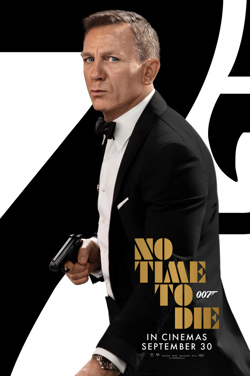
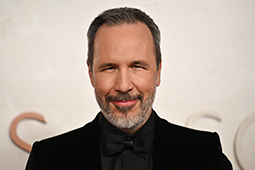

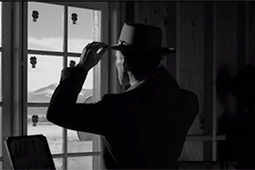
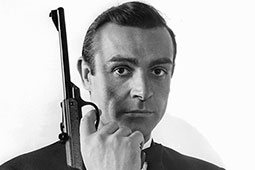
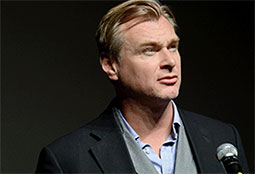


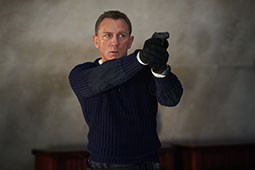
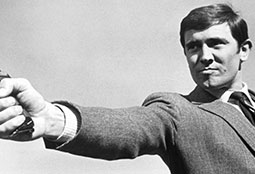
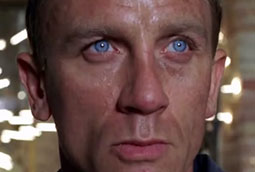


.jpg)
.png)





